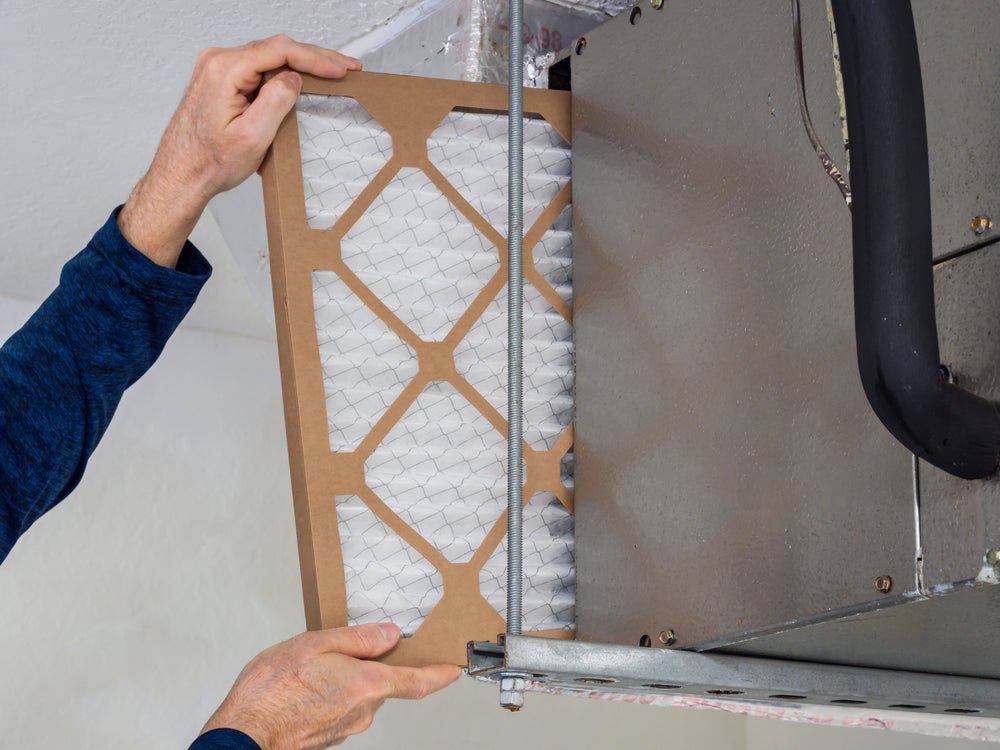
What is a Furnace Filter and How Do They Work?
Share
Furnace filters are essential to the functioning and lifespan of your HVAC system. They are positioned between the return air duct and the furnace itself, and their primary purpose is to trap airborne contaminants like dust and pet dander before they enter the heating and cooling system.
In capturing these particles, the filter serves two essential functions:
-
Improving Indoor Air Quality: By removing allergens and other pollutants from the air, furnace filters create a healthier environment, especially for people with allergies or respiratory issues.
-
Protecting Your HVAC Equipment: Preventing the accumulation of dust and debris in the furnace and air conditioner prolongs its life and maintains its efficiency.
How Furnace Filters Work?
Furnace air filters capture airborne particles and contaminants with two main techniques: physical filtration and electrostatic attraction.
Physical Filtration
Physical filtration uses a mesh or fibrous material to trap particles as air passes through the filter. The size of the spaces between the fibers determines the filter's ability to capture particles of different sizes.
As air flows through the return ducts and into the air filter, the fibers catch and hold onto particles, preventing them from entering your HVAC system and circulating throughout your home.
Electrostatic Attraction
Some furnace filters, known as electrostatic filters, use an additional technique to enhance their filtration capabilities. The filter medium material can be treated or created (triboelectric) to have an static charge when air passes through.
The electrostatic charge attracts and holds onto airborne particles, including smaller contaminants like smoke, bacteria, and allergens. This technique works together with physical filtration to provide a higher level of air purification.
Types of Furnace Filters
When you are shopping for a furnace filter, you'll encounter several types, each with its own set of benefits and drawbacks.
Here's a closer look at the most common options:
Fiberglass Filters
Made from layers of fiberglass fibers, these basic and affordable filters capture larger particles like dust and lint. While inexpensive and disposable, fiberglass filters typically have a low MERV rating (1-4) and can't trap very small particles.
Polyester Filters
Polyester filters are made from a denser material than fiberglass, allowing them to capture smaller particles more effectively. They are still relatively affordable and offer slightly improved filtration compared to fiberglass.
Pleated Filters
Pleated filters are constructed from folded and gathered sheets of cotton or polyester, or other synthetic materials increasing their surface area and allowing them to trap more particles. Available in various MERV ratings (usually 8-13), pleated filters are more efficient than fiberglass or polyester filters but may create more airflow resistance.
HEPA Filters
High-Efficiency Particulate Air (HEPA) filters offer the highest level of filtration, capturing at least 99.97% of particles as small as 0.3 microns. They are often advertised as having MERV ratings of 16-20, although ratings higher than MERV 16 are not officially recognized.
HEPA filters provide the highest protection against allergens and pollutants. However, they often require modifications to the HVAC system and can significantly restrict airflow, making them unsuitable for many homes. They are more often used in standalone air purifier systems.
How to Choose the Right Furnace Filter for Your Home
With so many options, selecting the right furnace filter for your home can seem overwhelming. Here are some key factors to consider:
Understanding MERV Ratings
The Minimum Efficiency Reporting Value (MERV) indicates a filter's efficiency at capturing particles between 0.3 and 10 microns in size. The scale goes from 1 to 16, with higher numbers indicating better filtration of smaller particles.
A MERV rating between 8 and 13 is generally recommended for residential use, as it offers an acceptable balance between filtration efficiency and airflow.
To learn more about MERV ratings and what they mean, see our articles comparing MERV 8 vs MERV 11 Air Filters and MERV 11 vs MERV 13 Air Filters.
Selecting the Correct Filter Size
To ensure proper fit and performance, buy a compatible replacement filter that matches the dimensions of your HVAC system. If the size information is not visible on your existing filter, measure the length, width, and thickness of the filter compartment and select a filter corresponding to those dimensions.
Considering Filter Materials and Features
In addition to the type of filter, consider factors like the material (e.g., fiberglass, polyester, or electrostatic) and any special features like antimicrobial treatments or odor-reducing properties. Remember that some filters, like HEPA filters, may offer better filtration but can also restrict airflow more than MERV 8-13 filters.
How Often Should You Change Your Furnace Filter?
The ideal frequency of furnace filter replacement depends on several factors, including the type of filter, your household conditions, and the manufacturer's recommendations. In general, filters should be replaced every three months. However, consider the following:
-
Filter Type: Fiberglass filters typically need to be replaced every 30 days, while pleated filters can last up to 6 months, depending on their thickness and environmental conditions. Thicker filters can retain more particles before they need to be replaced. Depending on the specific product, HEPA filters may have an even longer lifespan.
-
Household Conditions: If you have pets, live in a dusty area, or have family members with allergies, you may need to replace your filter more frequently to maintain optimal air quality.
-
HVAC Usage: During periods of heavy use, such as the peak of summer or winter, your filter may clog faster and require more frequent changes.
Read our comprehensive guide on how often to change your furnace filter to discover more about replacement schedules for filters by type, size, and capability and how to inspect and replace your filters.
Atomic Filters makes it easy to find and buy compatible replacement furnace filters for all major HVAC brands, including MERV 8, MERV 11, and MERV 13 furnace filters.
